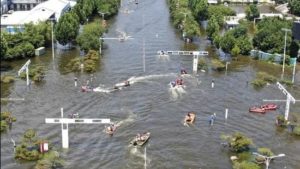
The death toll from torrential rains and floods in the central Chinese province of Henan has sharply jumped to 302, local officials said on Monday, adding that at least 50 more are missing.
The worst hit was capital Zhengzhou where 292 people including 14 trapped in a flooded subway carriage died, officials added. The official death toll, according to state media, was 99 as of Friday.
Hou Hong, the mayor of Zhengzhou, confirmed the death toll, telling reporters that 39 people were found dead in underground car parks.
The state council, China’s cabinet, announced an investigation into the floods at a press conference in the provincial capital, Zhengzhou.
Henan, a province with a population of around 109 million, was battered by the heaviest rainfall in decades in July, which triggered widespread floods, deaths and economic damage.
‘More than 13.91 million people in 150 county-level regions have been affected by the latest round of downpours since July 16. Over 1.1 million local residents have been relocated to safer places,’ Xinhua news agency reported.
The floods in Henan resulted in direct economic losses of 2.25 billion yuan (US$348 million) for China’s poultry and livestock industries after 248,000 pigs and 6.4 million chickens died.
The floods, described as the worst in decades saw some 15,000 farms affected, while 45,000 sheep and other large livestock died, China’s agriculture and rural affairs ministry was quoted as saying by the Hong Kong-based South China Morning Post.
The jump in the death toll comes within days of Beijing coming down heavily on the coverage of the floods by foreign media, accusing the BBC, for one, of broadcasting ‘fake news’ and saying the organisation was ‘naturally unpopular’ over its flood reportage.
The strong response came after the BBC called on Beijing to put a stop to the harassment of its journalists by nationalists who have accused foreign media of biased reporting.
Journalists from foreign media outlets covering the floods were harassed online and by local residents, with staff from the BBC and Los Angeles Times receiving death threats, according to the Foreign Correspondents’ Club of China (FCCC).
‘Rhetoric from organisations affiliated with China’s ruling Communist party directly endangers the physical safety of foreign journalists in China and hinders free reporting,’ the FCCC said in reference to the coverage of the floods.
‘The FCCC is disappointed and dismayed at the growing hostility against foreign media in China, a sentiment underpinned by rising Chinese nationalism sometimes directly encouraged by Chinese officials and official entities.’




 Driving Naari Programme launched in Chandigarh
Driving Naari Programme launched in Chandigarh






























